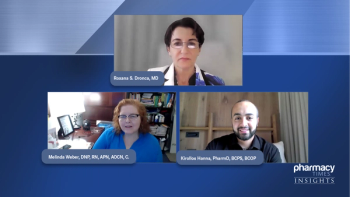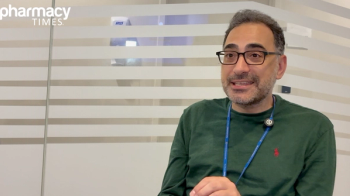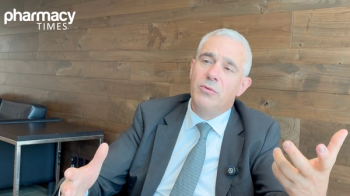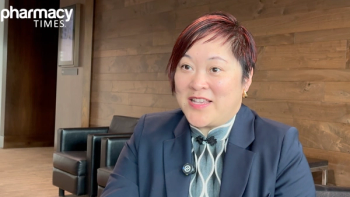
An expert discusses how integrating prefilled syringes into pharmacy vaccination workflows enhances speed, accuracy, and patient confidence by reducing preparation time and allowing staff to focus more on patient care and service quality.

An expert discusses how integrating prefilled syringes into pharmacy vaccination workflows enhances speed, accuracy, and patient confidence by reducing preparation time and allowing staff to focus more on patient care and service quality.

An expert discusses how prefilled syringes significantly reduce preparation time, cognitive load, and error risk in pharmacy vaccine administration, leading to safer, more efficient workflows and improved patient experience.

Panelists discuss how subcutaneous immune checkpoint inhibitors transform cancer care delivery by streamlining clinical workflows through faster administration in alternative care settings, improving patient quality of life by reducing treatment time and allowing greater flexibility in scheduling, and expanding access through home-based programs that serve rural and underserved populations while maintaining comprehensive monitoring and support systems.

Derek Webb, PharmD, discusses RSV in older adults, highlighting symptoms, risk factors, and barriers to vaccination.

Explore the evolving role of pharmacists in navigating FDA regulations and the impact of drug ads on patient care.

Derek Webb, PharmD, discusses RSV in older adults, highlighting symptoms, risk factors, and barriers to vaccination.

Matthew D. Clark, PharmD, highlights a pharmacist-led program that improved opioid safety in cancer care despite regulatory exemptions.

Discover how pharmacists play a crucial role in the OUD treatment process with buprenorphine, enhancing patient care and recovery outcomes.

MD Anderson's opioid stewardship program enhances patient safety and care by monitoring opioid use, addressing discrepancies, and fostering multidisciplinary collaboration in cancer treatment.

FDA enhances oversight of drug ads using AI to ensure compliance, addressing risks and benefits in direct-to-consumer advertising.

Gene therapy offers transformative potential in treating diseases like sickle cell and leukemia, highlighting pharmacists' crucial roles.

Panelists discuss how pharmacists play a crucial role in toxicity management and monitoring for CDK4/6 inhibitors (including proper QTc calculations, lab monitoring thresholds, and diarrhea mitigation strategies), how they incorporate NCCN guideline recommendations into clinical practice while identifying patients who might fall through the cracks (especially those not receiving chemotherapy), and how they consider sequencing CDK4/6 inhibitors based on postMONARCH trial data for patients with soft progression or low tumor burden without actionable mutations.

Panelists discuss how treatment selection between CDK4/6 inhibitors in early-stage breast cancer is primarily driven by trial eligibility criteria with abemaciclib being preferred when qualified, while in metastatic settings ribociclib is often favored due to overall survival data, and how adverse event profiles differ significantly among the 3 agents (neutropenia with palbociclib/ribociclib, QTc prolongation and drug interactions with ribociclib, and early-onset diarrhea with abemaciclib that typically improves with supportive care management).

Gene therapy revolutionizes treatment in oncology, highlighting pharmacists' vital roles in patient care and long-term monitoring.

In this video, experts who attended the 2025 International Myeloma Society (IMS) Annual Meeting highlighted topics of interest as well as pivotal data.

A real-world study at MSK reveals promising efficacy and safety of second-generation BTK inhibitors in mantle cell lymphoma treatment, influencing future guidelines.

Panelists discuss how IV administration of immune checkpoint inhibitors creates operational challenges, including infusion chair bottlenecks, complex scheduling, venous access difficulties, and time burdens for patients, while subcutaneous formulations offer potential solutions through simplified delivery, reduced infusion center strain, and improved patient convenience.

Alice Wang, PharmD, BCOP, discusses the rapid infusion of isatuximab for multiple myeloma, highlighting its benefits, safety, and improved patient convenience in treatment.

Pharmacists explore virtual solutions for opioid use disorder, enhancing treatment retention and accessibility while addressing economic impacts.

Pharmacists lead the charge in integrating pharmacogenetics into patient care, overcoming education barriers and enhancing treatment outcomes through expert guidance.

A panelist discusses how pharmacists can optimize shingles vaccine uptake by addressing cost barriers through insurance coverage, ensuring consistent vaccine recommendations across all health care touchpoints, and using a presumptive approach that assumes patients want protection rather than asking if they want a vaccine.

Mary Nauffal, PharmD, MS, BCOP, discusses innovative use of isatuximab for red cell aplasia post stem cell transplant, highlighting its potential in clinical trials.

Pharmacists play a crucial role in managing drug interactions and optimizing treatment with CDK4/6 inhibitors for HER2-positive breast cancer patients.

Xavier Leleu, MD, PhD, shares how OBI technology reduces preparation time and manual pushes for pharmacists.

Panelists discuss how CDK4/6 inhibitors can be considered for patients with visceral crisis based on limited data from the RIGHT Choice trial (though historically chemotherapy has been preferred), and how the number of positive lymph nodes in early-stage breast cancer drives treatment selection based on the specific inclusion criteria from the monarchE and NATALEE trials, with dual-eligible patients requiring consideration adverse effect profiles and patient-specific factors.

Panelists discuss how FDA-approved CDK4/6 inhibitors are used in early breast cancer (abemaciclib and ribociclib with different trial designs and dosing regimens) and metastatic breast cancer (palbociclib, ribociclib, and abemaciclib showing approximately 2-year progression-free survival advantages in various combination therapies).

Pharmacists enhance patient care by managing CDK4/6 inhibitors, addressing adverse effects and ensuring effective therapy selection in oncology.

Expert shares the evolving role of pharmacy in patient care, emphasizing treatment accessibility and monitoring.

Claudio Cerchione, MD, PhD, discusses the benefits of anti-CD38 quadruplet regimens for older patients with multiple myeloma.
